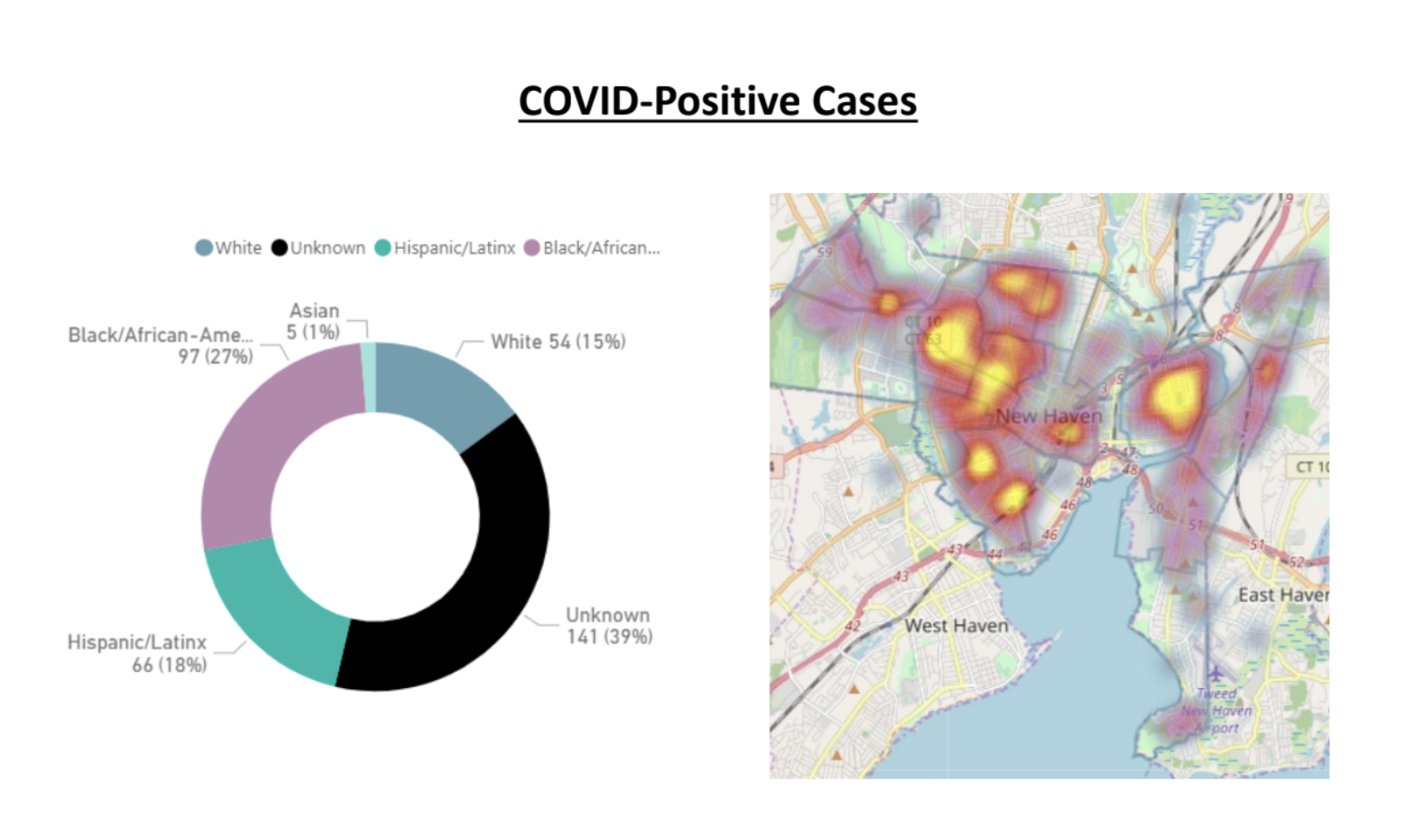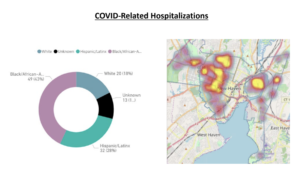
Courtesy of the City of New Haven
In line with reports out of major cities across the country, New Haven’s preliminary COVID-19 data reveals a disturbing trend: Black and Latinx individuals account for a disproportionate number of the Elm City’s positive cases, hospitalizations and deaths.
Mayor Justin Elicker revealed the numbers in Wednesday’s daily COVID-19 press briefing. He underscored that the data is preliminary and only includes positive tests — rather than also including patients awaiting testing results — so it may reflect which people are getting tested as well as other underlying variables. The city also lacks complete demographic data for its confirmed cases, as health officials have not reported racial statistics for 141 of the Elm City’s 363 patients. Still, the mayor and his health department noted a clear pattern: While New Haven’s general racial breakdown is about one-third each white, black and Latinx, the latter two groups comprise a disproportionately high share of COVID-19 health complications — from positive cases to fatalities — as compared to white individuals. The disparity is greatest in hospitalizations, for which 43 percent of patients are black, 28 percent are Latinx and 18 percent are white.

“[This data] helps advise the community in New Haven and beyond about how we might react more aggressively to address the areas and populations that are more heavily impacted,” Elicker said in Wednesday’s press conference. “We’re interested in working together to respond to this information as quickly as possible … This is indicating that communities of color, for a variety of different reasons, are much more significantly impacted by COVID-19.”
Those reasons, the mayor said, could include a variety of health and economic factors. People of color are more likely to have underlying health conditions that lead to more serious cases of COVID-19. Race and income are highly correlated in the Elm City and across the country, and it is especially difficult for low-income individuals to self-isolate due to denser living environments, the mayor noted. Moreover, remote work is not an option for many low-income workers, who not only have to report to essential jobs but also rely on public transportation to do so.
In addition to raw data, the mayor’s office also offered heat maps displaying COVID-19 cases in the city. The highest concentrations are in Newhallville and Dixwell, both of which are predominantly black neighborhoods. According to the Community Alliance for Research and Engagement, 17 percent of residents in these two neighborhoods report suffering from asthma, more than double the national rate. The CDC has warned that those with moderate to severe asthma may have increased risk of serious cases of COVID-19, as is the case with other respiratory illnesses.
Elicker noted that data coming out of other large cities reveals the same trend. New York’s preliminary data, also released on Wednesday, indicates that black and Latinx New Yorkers are twice as likely to die of the virus as their white counterparts. Similar reports have come out of scores of cities and states across the country. In Louisiana, blacks comprise about 33 percent of the state population and 70 percent of coronavirus-related deaths.
With early data putting New Haven squarely within the existing trend, Elicker said that the city will prioritize conversations with leaders from hard-hit neighborhoods and communities.
“I’d like to have more conversations with leadership in communities of color in New Haven … so that we can all work together to try to understand what’s the best way to respond,” Elicker said.
In recent days, several black men in New Haven have shared their experiences with contracting the novel coronavirus. Ward 29 Alder Brian Wingate, who represents Beaver Hills and part of Newhallville in the city’s legislature, said that knowing of others’ experiences can do wonders for a patient’s mental state while battling the disease. Now recovered, he is donating his plasma so that health researchers can use his antibodies in developing a potential cure — a decision that he finds particularly important as a black male who survived a disease that kills both black and male community members at disproportionately high rates.
In an interview with the New Haven Independent, New Haven resident Diamond Powell Sr. said that he decided to come forward about his diagnosis after hearing black people in his community doubt the risk of their own exposure. In going public, he hoped to reduce the stigma that he said comes with a positive test.

“People are making people feel ashamed that they have the disease,” he said. “You’d be shocked how many people have tested positive, but they’re in this battle by themselves.”
He has since received an outpouring of support, from well-wishers on Facebook to friends opening up about their own experiences.
In addition to community conversations and awareness campaigns — which include the Health Department’s “Spread the facts, not the virus” campaign, shared in both English and Spanish — the city is looking to bolster existing testing and self-isolation infrastructure. On the testing front, the city needs more and faster results, Elicker said. While conversations are still in early stages, the mayor noted small-scale testing efforts at Fair Haven Health Clinic and Cornell Scott-Hill Health Center, both of which operate in predominantly Latinx neighborhoods. Gov. Ned Lamont announced on Wednesday that CVS will open a testing site in New Haven with the ability to conduct 1,000 tests per day and process results in 15 minutes.
Increased testing capacity is critical to combatting the virus in the long run, Elicker said on Wednesday. Epidemiologists, he said, have highlighted the importance of proactive testing and contact tracing to manage current and future outbreaks.
Elicker’s administration is also looking to open self-isolation sites that can accommodate those who would otherwise return home to close quarters and risk exposing family members, the mayor said. City officials are currently in conversation with several potential partners.
As of Wednesday evening, New Haven has 363 confirmed cases of COVID-19, and 13 have died due to the virus.
Mackenzie Hawkins | mackenzie.hawkins@yale.edu
Heat maps and charts courtesy of the city of New Haven.







